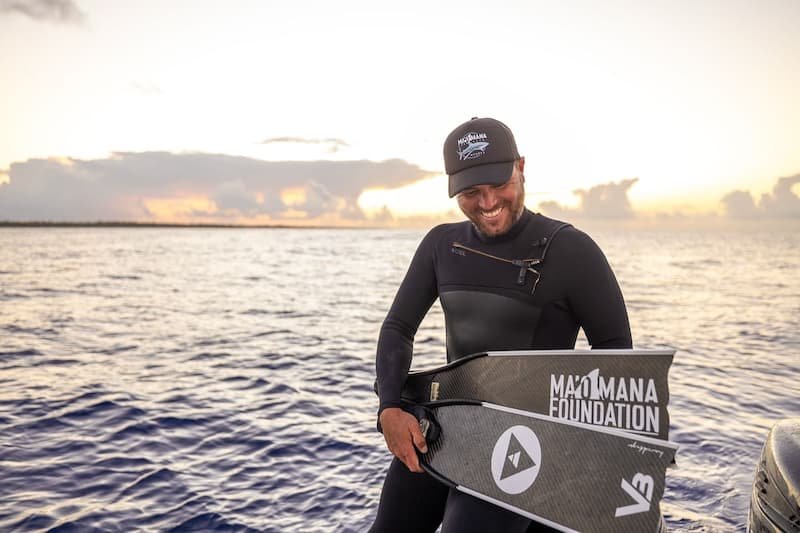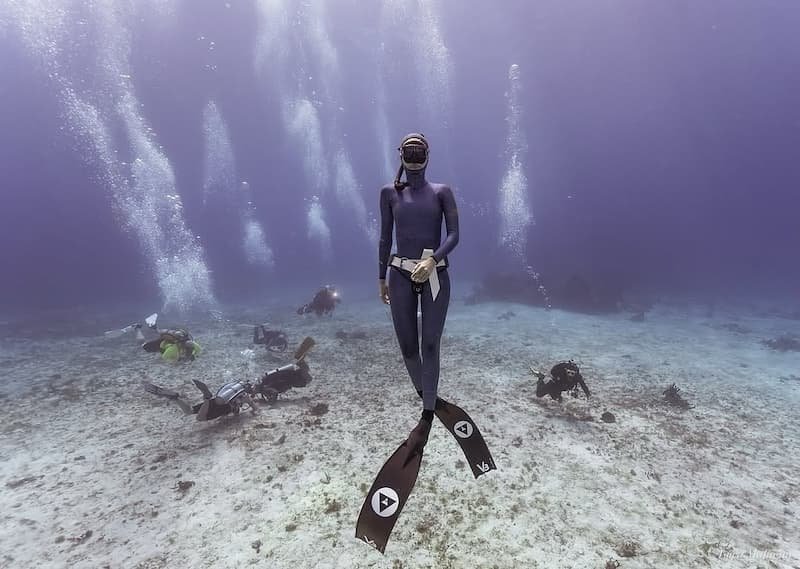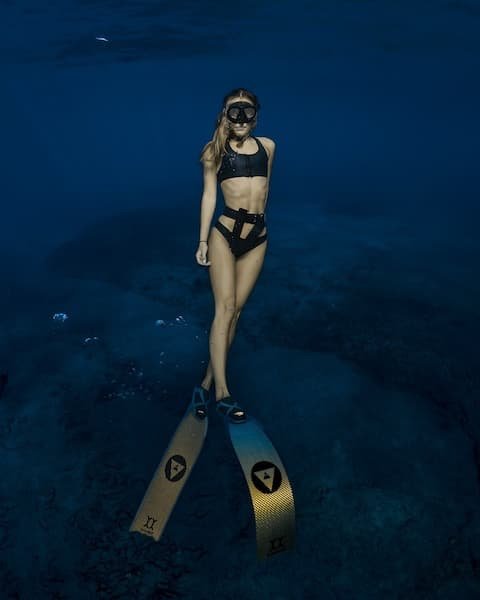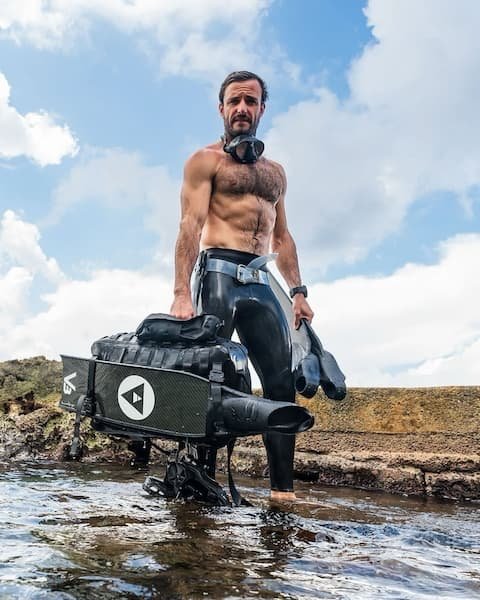
 Katie Wood
Freediver, Writer, Explorer
Katie Wood
Freediver, Writer, Explorer

 Katie Wood
Freediver, Writer, Explorer
Katie Wood
Freediver, Writer, Explorer
Freediving is often framed as a mental game. And it is — up to a point. You learn to quiet the mind, slow the breath, still the body. You train tables. You fine-tune technique. You log dive after dive. But at some point, despite all your preparation, things feel… off. You’re tired, or short-tempered, or strangely anxious. You’re bloated. Or cold. Or breathless in ways that don’t make sense. You blame your training. Your diet. Your gear.
But what if it’s not any of that? What if it’s your hormones?
Let’s talk about the invisible system that governs your energy, your recovery, your metabolism, your mood — and yes, your performance underwater. Because hormones are not just a women's issue. Or a “health” thing. They’re central to how every freediver functions, adapts, and thrives.
When we talk about hormones, we’re talking about messengers. Chemical signals sent out by glands in your body to regulate everything from your heart rate to your hydration to your stress response.
Think of your endocrine system as your internal dive computer — constantly recalculating, adjusting, and responding to internal and external pressures.
The major players? Cortisol, testosterone, estrogen, progesterone, insulin, thyroid hormones, adrenaline, and a few others behind the scenes. Each one contributes to how your body performs under stress — whether that’s the pressure of a dive or the pressure of daily life.
Ignore them, and you risk stagnation. Understand them, and you unlock another layer of performance.

Let’s start with cortisol — the hormone that gets a bad rap. Yes, it’s your primary stress hormone. But it’s also what wakes you up in the morning. It mobilizes energy, regulates your sleep-wake cycle, and helps you respond to acute stress (like, say, holding your breath while finning through a thermocline). The problem isn’t cortisol itself — it’s chronic cortisol.
Too much, too often, and your body starts to break down. Muscle repair slows. Recovery suffers. Sleep gets erratic. Anxiety increases. You’re less resilient, both in and out of the water.
Freedivers who overtrain, undereat, or undersleep are often operating in a constant state of elevated cortisol. It’s one of the fastest ways to plateau — and one of the hardest to notice.
Managing cortisol isn’t about stopping stress. It’s about recovering from it. Breathwork helps. So does sleep. And yes — that rest day you keep skipping.
You feel it right before a dive. That flush of alertness. The heightened focus. The slight buzz of energy in your limbs. That’s adrenaline doing its job.
In controlled bursts, adrenaline sharpens your response, increases blood flow, and readies your muscles. But in excess — especially when it spikes without a real threat — it can derail your dive.
Freediving demands stillness. Control. Slowness. Too much adrenaline makes you kick harder, breathe shallower, burn more oxygen, and burn out faster.
Adrenal dominance is common in divers who are nervous, dehydrated, or overly caffeinated. It can also be triggered by poor sleep or mental stress. If you find yourself feeling “amped” instead of relaxed before a dive — you might be dealing with a hormonal mismatch.
Balance adrenaline by re-centering before your session. Skip the pre-dive coffee. Breathe low, slow, and soft. Reset the system.

Insulin governs how your body processes sugar — and therefore, energy.
When insulin is working well, your body absorbs glucose efficiently, stores glycogen, and maintains stable blood sugar. When it’s out of balance (due to poor diet, stress, or metabolic issues), you end up with energy spikes and crashes — not ideal for any sport, but especially problematic when breath-hold is involved.
Freedivers often experiment with fasting, keto, or low-carb diets to improve apnea time. And while some protocols can be useful, going too far in either direction can backfire — especially if you disrupt your insulin sensitivity.
The key? Stable blood sugar. That means nutrient-dense, unprocessed meals with enough carbs to fuel performance, but not so much that you spike and crash.
You’re not just fueling a dive. You’re fueling a hormonal system that fuels the dive.
Whether you’re male or female, testosterone matters.
It supports muscle mass, recovery, bone density, libido, and confidence — all things that impact how you move, feel, and perform underwater. It’s not about aggression. It’s about resilience.
Low testosterone is becoming more common across the board, especially in men under chronic stress, poor sleep, and high training loads without proper recovery. Signs include low motivation, poor recovery, mood swings, and loss of muscle.
Freedivers aren’t immune. Long hours in the sun, fasted training, and minimal rest can chip away at hormonal stability over time.
Supporting testosterone isn’t about supplements. It’s about basics: sleep, strength training, healthy fats, sunlight, and managing stress.
You don’t need to chase numbers. But you do need to respect the biology.
For women, hormone fluctuations are a cycle — not a straight line.
Estrogen rises in the first half of the menstrual cycle, improving mood, cognition, coordination, and oxygen utilization. It’s a prime time for pushing depth, training harder, or filming content.
Progesterone dominates the second half. It increases body temperature, fluid retention, and fatigue. Recovery slows. Apnea feels harder. And yes — cramps, bloating, and breast tenderness can directly affect comfort in a wetsuit.
None of this makes women worse divers. It just means the cycle has to be accounted for.
Freediving schools rarely address this. And that needs to change. Understanding your cycle isn’t a weakness — it’s a tool. It lets you adapt your training, your dive days, and your expectations with compassion and clarity.
For instructors, this awareness is essential. For students, it’s empowering.

Your thyroid governs metabolism. It affects body temperature, energy output, and how efficiently your cells use oxygen. In other words — it’s central to freediving.
Low thyroid function (hypothyroidism) can lead to cold intolerance, sluggish recovery, brain fog, and reduced aerobic capacity. For divers in cold water, the impact is even greater.
Women are more likely to suffer from thyroid dysfunction, especially if overtrained, underfed, or chronically stressed.
If you’re always freezing in the water — even in a thick wetsuit — or if your energy crashes after short dives, it might be worth getting your thyroid checked.
Support thyroid function with iodine-rich foods (like seaweed), selenium, and adequate calories. And again — sleep and stress management are foundational.
The body is a feedback machine. When something feels off, it usually is. A sluggish morning dive. A sudden panic on a line you’ve done 100 times. An inability to hit static times you once found easy. These aren’t always technical issues. Sometimes, they’re hormonal whispers. Sometimes, they’re hormonal screams.
Tracking your cycle, your energy, your recovery, and your mood isn’t woo-woo. It’s wisdom.
Apps help. Blood tests help. But the biggest shift happens when you start listening.

Hormones aren’t currently part of freediving education. They should be.
Imagine a beginner course that didn’t just teach you how to equalize, but how your stress hormones affect your breath-hold. A school that gave female divers space to adapt training around their cycle. A program that emphasized sleep and nutrition not just as lifestyle choices — but as performance variables.
It’s not complicated. It just takes intention.
Freediving is a sport of awareness. Let’s make that awareness biological as well as mental.
You can’t control every hormone, every fluctuation, every shift. You’re not a robot. And that’s a good thing.
But when you understand your body — when you know what to expect, what’s normal, what’s off — you dive with more grace. More intuition. More intelligence.
You know when to push and when to pause. When to go deep and when to rest on the surface. That’s the essence of freediving: presence, not pressure.
So let’s stop pretending our bodies are static. Let’s start honoring their rhythms.
Because the better you understand your hormones, the better you understand your dive.